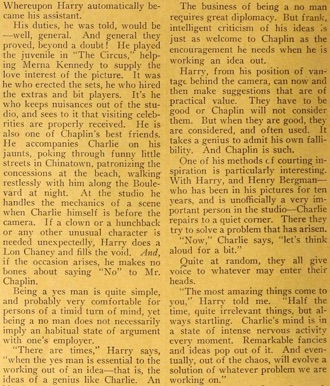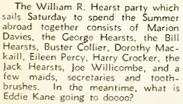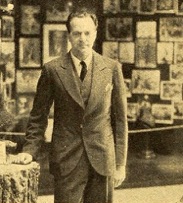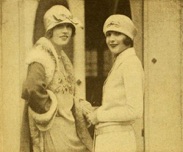The Circus 1927 1928 1929 next previous
The Circus Clippings 161/376
Margaret Reid, Picture-Play, New York, December 1927.
No, this isn‘t a beauty contest – it‘s just Norma Talmadge and
Marion Daviies playing hookey from the studio
and devoting the entire day to having a good time.
(...) Motion Picture, July 1925
& Harry Crocker
(...) Motion Picture, Dec. 1928, detail
& The William R. Hearst party which sails Saturday to spend
the Summer abroad together consists of Marion Davies,
the George Hearsts, the Bill Hearsts, Buster Collier, Dorothy
Mackaill, Eileen Percy, Harry Crocker.
(...) Hollywood Reporter, May 23, 1934
„The nicest thing in Hollywood“
Editorial content. „He‘s Charlie Chaplin‘s Side-kick
Harry Crocker, Chaplin‘s young assistant director, is also
his close friend and adviser, and is not afraid to say
,No!‘ to the great comedian when he disapproves of any
of his ideas
By Margaret Reid
Outside of being Chaplin himself, just about the nicest
thing in Hollywood for an ambitious young man to be
is Chaplin‘s assistant director. That he is the person who
takes and interprets orders from Mr. Chaplin on the
set is only incidental. He is also Charlie‘s social companion,
his mental stimulant, his protecting dragon, his safety
valve in moments of distress. The position demands versatility,
to say nothing of diplomacy and a sense of humor.
And only the brightest gentlemen need apply.
To be Charlie‘s assistant is a great stepping-stone
to success. It may be that the close association
with Chaplin does something remarkable to men. But I think
it is that the requirements of Charlie‘s assistant are
so stringent that any one who could get the job in the first
place is too talented to fail when the lights out on
his own.
Monta Bell was once Chaplin‘s assistant. So was
Edward Sutherland. Bell is now well to the head
of the moderns among directors. Sutherland also. Harry
d‘Arrast is another who once assisted Chaplin.
He is now one of Paramount‘s most valued directors.
The latest young man to fill the enviable office
of assistant director to Chaplin is Harry Crocker. Harry,
as has often been mentioned before, is a scion
of the famous and aristocratic Crocker banking family
of San Francisco. What is more relevant is that
he is clever, and probably one of the most popular young men
in Hollywood. This popularity is a manifestation of
genuine affection for him, and has nothing to do with his being
a millionaire, since Harry is his own man, driving
a not-very-new roadster. and having only a little of his salary
put by in the bank for a foggy day. He is tall, he is dark,
he is handsome. He has a grand sense of humor, and a fine
mind, with a gift for unerring logic.
Chaplin first met Harry Crocker at Montmartre, in the usual
casual fashion that one does meet people there. A short
time later, they met again at a party. The game of charades
brought the two together. Harry‘s wit and keen sense
of comedy caused Chaplin to notice him. Almost immediately
thereafter, however, Charlie left for New York, and
Harry continued to be Hollywood‘s favorite extra man.
As an extra, Harry was unique. It was as such that I first
knew him – we worked in the same pictures at various
times. I particularly remember a long stretch of night work,
in a Metro-Golwyn film. The nights were cold, our
costumes designed for California sunshine only, and the work
hard. The concentrated mood of the whole company –
except for Harry – would have sunk a battleship to the bottom
of the ocean. But Harry‘s wit and good humor revived
the tired, disgruntled extras as they warmed themselves
at the stoves that lined the outskirts of the set.
He has a gift for utterly foolish comedy, that springs, I think,
from a very genuine enjoyment of life. His imitations
of celebrities – or nonentities, either – are telling, though never
too unkind.
Harry and I were both acting as merry masquers
in La Bohème when Chaplin returned from New York. Harry
came onto the set one morning simply brimming with
excitement. He had run into Charlie at luncheon the day before,
and out of a clear sky, the comedian had asked:
,Do you want a job as my assistant?‘ Harry had tried to reply
,Yes!‘ without appearing too dumfounded and Charlie
had told him to come over to his studio the following week.
On the next Monday, Harry got an hour off and
raced over to the Chaplin studio. Charlie, in his vague fashion,
had not told any one he was expecting him. The studio
manager was therefore a bit startled by this strange young man
who calmly announced that he was Mr. Chaplin‘s new
assistant. Charlie, sought out in the depths of the studio, said,
,Oh, yes, yes – surely ––‘ Whereupon Harry automatically
became his assistant.
His duties, he was told, would be – well, general. And
general they proved, beyond a doubt! He played the juvenile
in The Circus, helping Merna Kennedy to supply the
love interest of the picture. It was he who erected the sets,
he who hired the extras and bit players. It‘s he who
keeps nuisances out of the studio, and sees to it that visiting
celebrities are properly received. He is also one of
Chaplin‘s best friends. He accompanies Charlie on his jaunts,
poking through funny little streets in Chinatown,
patronizing the concessions at the beach, walking restlessly
with him along the Boulevard at night. At the studio
he handles the mechanics of a scene when Charlie himself
is before the camera. If a clown or a hunchback or any
other unusual character is needed unexpectedly, Harry does
a Lon Chaney and fills the void. And, if the occasion
arises, he makes no bones about saying ,No‘ to Mr. Chaplin.
Being a yes man is quite simple, and probably
very comfortable for persons of a timid turn of mind, yet being
a no man does not necessarily imply an habitual state
of argument with one‘s employer.
,There are times,‘ Harry says, ,when the yes man
is essential to the working out of an idea – that is, the ideas
of a genius like Charlie. An idea comes vaguely and
inarticulately at first. No matter how much you might, in your
heart, disapprove of it, it would be fatal to say so to its
originator during that formative period. It would stem the flow
of thought. One must just sit by and be encouraging
and say, ,Yes, yes – that‘s great!‘ until the idea is completely
formed. Then you can voice your criticisms.‘
The business of being a no man requires great diplomacy.
But frank, intelligent criticism of his ideas is just as
welcome to Chaplin as the encouragement he needs when
he is working an idea out.
Harry, from his position of vantage behind the camera,
can now and then make suggestions that are of practical value.
They have to be good or Chaplin will not consider them.
But when they are good, they are considered, and often used.
It takes a genius to admit his own fallibility. And Chaplin
is such.
One of his methods of courting inspiration is particularly
interesting. With Harry, and Henry Bergman – who has
been in his pictures for ten years, and is unofficially a very
important person in the studio – Charlie repairs to a
quiet corner. There they try to solve a problem that has arisen.
,Now,‘ Charlie says, ,let‘s think aloud for a bit.‘
Quite at random, they all give voice to whatever may
enter their heads.
,The most amazing things come to you,‘ Harry told
me. ,Half the time, quite irrelevant things, but always startling.
Charlie‘s mind is in a state of intense nervous activity
every moment. Remarkable fancies and ideas pop out of it.
And eventually, out of the chaos, will evolve a solution
of whatever problem we are working on.‘
There probably isn‘t another such school for embryo
directors as the Chaplin studio. Nor another such tutor as Chaplin.
He is generous with wealth of knowledge. And Harry
Crocker is an apt pupil. He hasn‘t quite made up his mind
yet whether to devote himself to acting or directing.
But whatever he chooses, he is sure to be a credit to Charlie.“
Two photos.
Redaktioneller Inhalt
The Circus 1927 1928 1929 next previous





